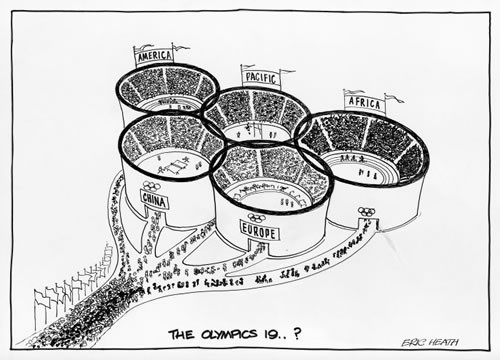
This Eric Heath cartoon appeared in the Dominion on 2 September 1976, a month after the Montreal Olympics ended. The five Olympic rings have become the high walls of five separate stadiums, labelled 'America', 'Pacific', 'Africa', 'China' and 'Europe'. The cartoon posed the question of whether political disputes would destroy the internationalism of the Games' ideals − a genuine fear at the time, and one that appeared to be confirmed by events in Moscow (1980) and Los Angeles (1984).
All Blacks' Olympic fallout
In the lead up to the Beijing Olympics the New Zealand media highlighted protests disrupting the Olympic Torch Relay and calls by human rights and press freedom groups to boycott the opening ceremony. It was not the first time the Olympics had been used by those in power or their opponents for political means. In 1976, New Zealand athletes found themselves at the centre of a furore that cast a dark shadow over the Montreal Games.
Earlier in the year the All Blacks had toured South Africa in defiance of United Nations' calls for a sporting embargo. Incensed African nations had already threatened to boycott Montreal if the tour went ahead. When it did, they demanded that the International Olympic Committee (IOC) exclude New Zealand from the Games. The IOC found no justification for banning New Zealand and this country's athletes competed as usual.
Among the most eagerly anticipated events at the Montreal Olympics was the expected 1500-m showdown between John Walker of New Zealand and Filbert Bayi of Tanzania. But Bayi would not compete, with Tanzania the first African nation to announce that it would boycott the Games. In all, more than 20 African nations stayed away, causing a massive reorganisation of scheduled events.
The New Zealand team manager gave instructions to the athletes, particularly Walker, 'not to talk to reporters about the present situation'. Due to the boycott, and tragic events at the previous Munich Olympics, New Zealand athletes also faced added security. The rowing team, Walker and fellow runner Rod Dixon chose not to attend the opening ceremony − the rowers because they were competing that day, Walker because he had a time trial later that day, and Dixon because he had a hard run in the morning. With the Olympic Village practically deserted, security concerns saw armed guards posted in their rooms.
Despite the undoubted additional pressure on the athletes, the team that represented New Zealand in Montreal performed with distinction. Walker's winning run in the 1500 m remains an enduring image of New Zealand's Olympic success. Our other medal winners were the hockey team, which beat Australia 1-0 in the gold-medal match, Dick Quax, who won silver in the 5000 m, and the rowing eight, which claimed bronze.

Community contributions